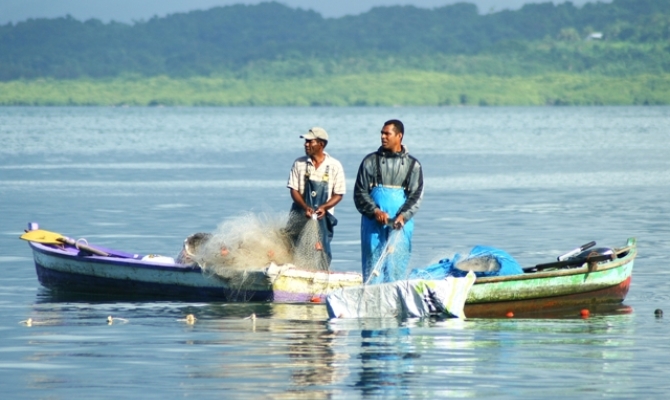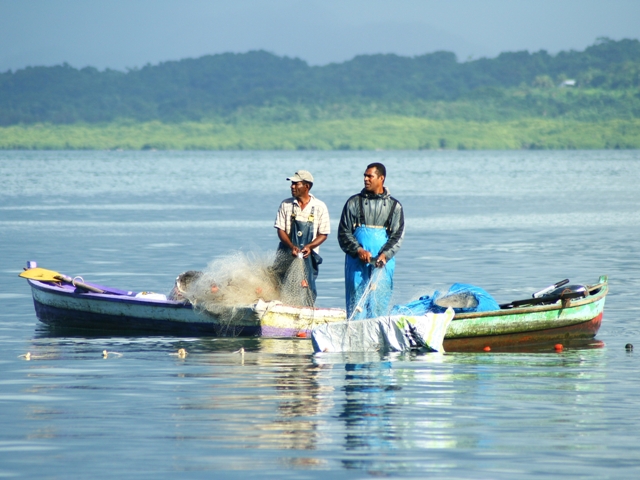
Island and Ocean Ecosystems
3 December 2013, Suva Fiji - By Josephine Navula a journalism student of the Fiji National University:- People who are dependent on fisheries need to make some changes in their ways of fishing, a representative of a research centre based in Malaysia said.
WorldFish Centre scientist Phillipa Cohen was responding to concerns from several local resource owners about the significant decrease in catch.
"Most people (are) overfishing and we advise them to decrease their methods like over-harvesting, and for them to balance between their present and future in terms of fishing," Ms Cohen said.

Photo courtesy of Mr. Ian Lyons - Morning Catch in Fiji
She was at the 9th Pacific Islands Conference on Nature Conservation and Protected Areas hosted in Suva, Fiji from 2 to 6 December.
WorldFish is an international, non-profit research organisation engaged in research for a food secure future.
"Now people are finding it hard to catch fish, because the populations are rising," Ms Cohen explained.
"There are a lot of commercial fisheries going on and, most importantly, pollution that kills the marine life."
Sabeto fisherman Mr. Vereniki Sauturaga said their catch was nearing crisis point.
"We manage to catch some fish when we go out fishing, but it's not as many as we usually catch before," he said.
He said he travelled from Nadi on Monday to attend the conference because he hoped to find solutions to their problem.
He said they had made several adjustments to their practices in the hope that fish stock would increase.
"Our village now put up signs for people not to litter near the river or sea because most of the times we see rubbish," he said.
Josephine Navula is a member of the Media Team providing coverage of the 9th Pacific Islands Conference on Nature Conservation and Protected Areas from 2 to 6 December in Suva, Fiji. This is a partnership between the Fiji National University (FNU), University of the South Pacific (USP), SPREP and Pacific Islands News Association (PINA) whereby a team of 10 journalism students are mentored by senior reporters as they cover the conference. This activity is funded by the Pacific Assistance Media Scheme (PACMAS).
WorldFish Centre scientist Phillipa Cohen was responding to concerns from several local resource owners about the significant decrease in catch.
"Most people (are) overfishing and we advise them to decrease their methods like over-harvesting, and for them to balance between their present and future in terms of fishing," Ms Cohen said.

Photo courtesy of Mr. Ian Lyons - Morning Catch in Fiji
She was at the 9th Pacific Islands Conference on Nature Conservation and Protected Areas hosted in Suva, Fiji from 2 to 6 December.
WorldFish is an international, non-profit research organisation engaged in research for a food secure future.
"Now people are finding it hard to catch fish, because the populations are rising," Ms Cohen explained.
"There are a lot of commercial fisheries going on and, most importantly, pollution that kills the marine life."
Sabeto fisherman Mr. Vereniki Sauturaga said their catch was nearing crisis point.
"We manage to catch some fish when we go out fishing, but it's not as many as we usually catch before," he said.
He said he travelled from Nadi on Monday to attend the conference because he hoped to find solutions to their problem.
He said they had made several adjustments to their practices in the hope that fish stock would increase.
"Our village now put up signs for people not to litter near the river or sea because most of the times we see rubbish," he said.
Josephine Navula is a member of the Media Team providing coverage of the 9th Pacific Islands Conference on Nature Conservation and Protected Areas from 2 to 6 December in Suva, Fiji. This is a partnership between the Fiji National University (FNU), University of the South Pacific (USP), SPREP and Pacific Islands News Association (PINA) whereby a team of 10 journalism students are mentored by senior reporters as they cover the conference. This activity is funded by the Pacific Assistance Media Scheme (PACMAS).